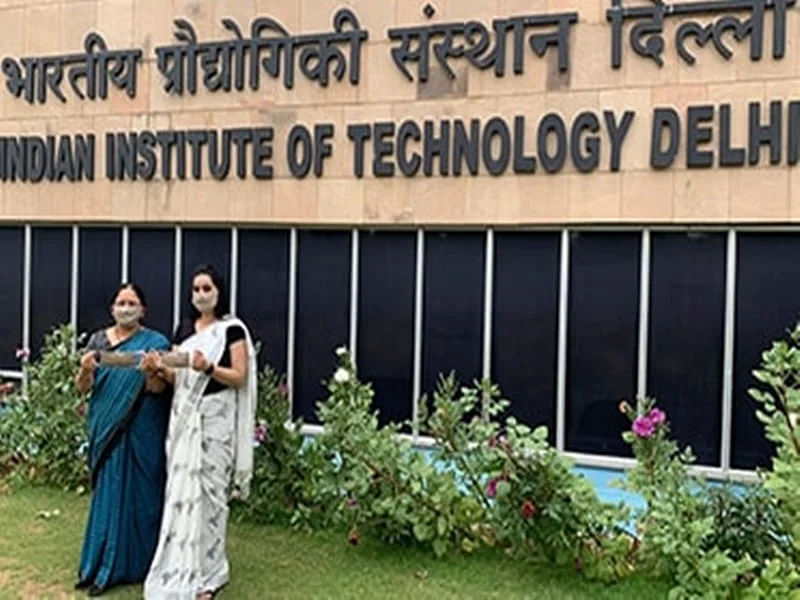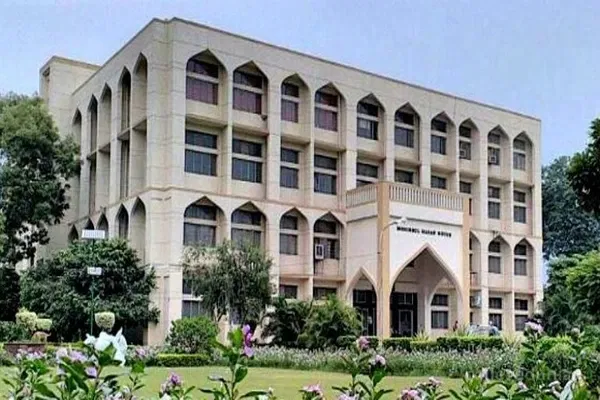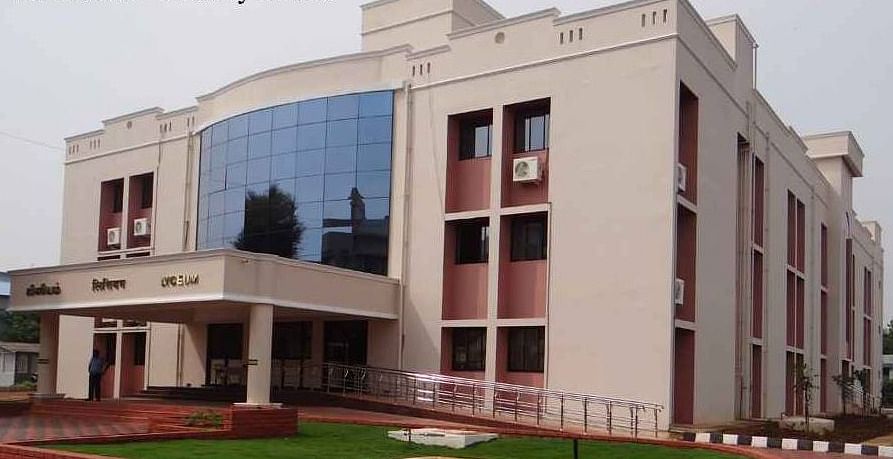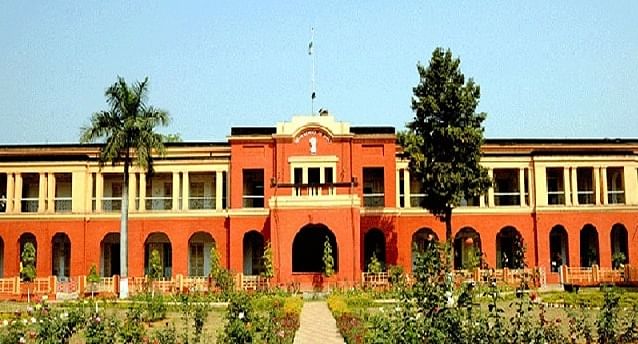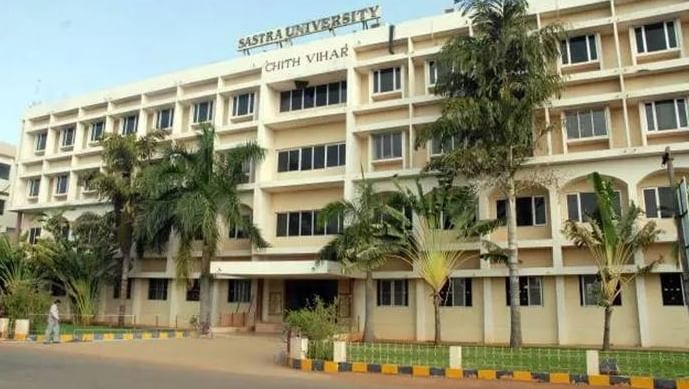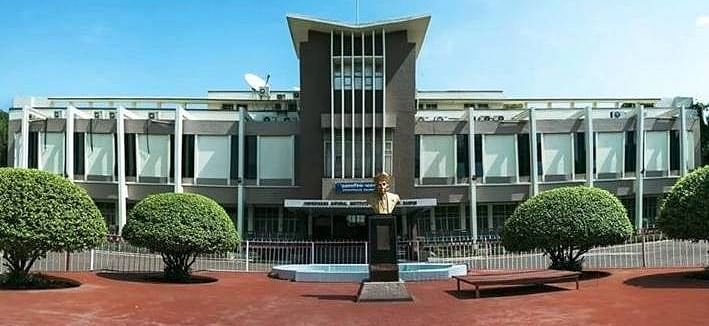M.Tech Power System Engineering

M.Tech Power System Engineering is a two-year-long full-time postgraduate course that deals with the processes of monitoring, developing, designing and evaluating high-end power systems for managing a variety of challenging projects and research work. Students are equipped with the knowledge of various industrial motors, generators, transformers, and other electrical devices. This course offers ample job opportunities to students, and they can work as a Power System Engineer, Energy Manager, Electrical Engineer, Power Plant Incharge, Power Analyst, Manufacturing Engineer etc.
Table of Contents
- About M.Tech Power System Engineering
- Eligibility Criteria for M.Tech Power System Engineering
- How To Get Admission in M.Tech Power System Engineering?
- Popular Entrance Exams for M.Tech Power System Engineering
- Top 10 M.Tech Power System Engineering Colleges in India
- Fee Structure for M.Tech Power System Engineering
- Syllabus and Subjects for M.Tech Power System Engineering
- Why Choose M.Tech Power System Engineering?
- Scope For Higher Education
- Salary of a M.Tech Power System Engineering Graduate
- Career Options After M.Tech Power System Engineering
- Skills That Make You The Best M.Tech Power System Engineering Graduate
M.Tech Power System Engineering Course Details
| Degree | Masters |
| Full Form | Master of Technology in Power System Engineering |
| Duration | 2 Years |
| Age | No specific age limit |
| Minimum Percentage | 50-60% |
| Average Fees | ₹15K - 3 LPA |
| Average Salary | INR 3- 8 LPA [Source: Payscale] |
| Employment Roles | Project Engineer, Electrical Design Engineer, Project Manager, Technical Director, Service Engineer |
| Top Recruiters | Fluor Corporation, BHEL, BSNL, HAL, Indian Railways, Hydroelectric Power Plants, Thermal Power Plants, State Wise Electricity Boards |
About M.Tech Power System Engineering
M.Tech Power System Engineering is a two-year electrical engineering postgraduate program that offers specialization in Power Systems. The course mainly focuses on concepts like conversion, transmission, distribution, storage, and utilization of electric energy. This course falls under the umbrella of M.Tech.
M.Tech Power System Engineering contains electives that students can choose from. It aims to create professionals for the Thermal Power Plants, State Wise Electricity Boards, Steel Industry, Electric Power Stations, Research Establishments, Colleges & Universities who can work as electrical engineers in the organizations.
Eligibility Criteria for M.Tech Power System Engineering
M.Tech Power System Engineering admission is offered to only those students who meet the eligibility requirements. The minimum M.Tech Power System Engineering eligibility requirement includes, students must have pursued an undergraduate degree in B.Tech/BE in any relevant engineering stream with a minimum aggregate of 50% from a recognized Institute or Master Degree in Science with Mathematics. There is no specific age limit for M.Tech in Power System Engineering. Students should additionally pass the National Level entrance exam GATE or other entrance exams conducted by colleges for admission.
How To Get Admission in M.Tech Power System Engineering?
For pursuing M.Tech in Power System Engineering, students must ensure that they satisfy the eligibility criteria. While some colleges offer admission to the M.Tech Power System Engineering program based on marks obtained by students in the national level entrance exam GATE, other colleges conduct their own entrance exams for testing the eligibility of students for admission. Applications for admissions may be availed both from the University website or by directly visiting the college's admissions office. M.Tech degree is part of a master’s program in the field of engineering, and hence, students get a chance to learn about the concepts in great detail and depth. Mentioned below are the details of the admission process in general:
How to Apply?
M.Tech Power System Engineering course information for admissions can be found on the college's official websites in which the students want to apply. Admission registration can be carried out through online and offline methods. Students must visit the college campus for offline admissions, fill out the application form, collect the brochure, and submit all the required documents. For online applications, students should visit the college's admission website and fill out the application form. The submission of the application fees can be made via online money transfer or through cheques/demand drafts from the bank. On submission of the application form, students will receive further correspondence from the college.
Selection Process
The selection process for M.Tech Power System Engineering in India is primarily based on the aspirant's entrance exam marks. Some colleges conduct their own entrance exams for admission. Based on the merit obtained by the student in the qualifying exam or an entrance exam, the shortlisted candidates are called for the group discussion and personal interview rounds conducted by the colleges. Based on the overall marks obtained by the students, the eligible candidates are offered admission to the program. Admission is strictly offered to only those students who clear the minimum cut-off of the respective college and fulfill the eligibility requirements. The admit card and other details regarding the exam are notified on the college website beforehand. The students are informed about the results through email communication or can visit the colleges' official website.
Read More on M.Tech Admission
Popular Entrance Exams for M.Tech Power System Engineering
Almost all colleges offering M.Tech in Power System Engineering have an entrance exam-based admission process. The national level entrance exam, GATE, is considered in some colleges while others conduct their own entrance exams. Some of the top M.Tech Power System Engineering entrance examinations are:
A Quick Glance at the M.Tech Power System Engineering Entrance Exams
Students who desire to opt for M.Tech Power System Engineering should study the exam pattern and syllabus well before time. This will help students in timely preparation for the entrance exams. In general, the most popular entrance exam, GATE, has the following pattern:
- Sixty-five questions carrying 100 marks, which are to be completed in 3 hours or 180 minutes.
- There are three sections, including General Aptitude, Engineering Mathematics, and Core Subjects.
- The Engineering Mathematics will carry around 15% of the total marks, the General Aptitude section will carry 15% of the total marks, and the remaining 70% of the total marks is devoted to the core subject of the paper.
- GATE would contain questions of two different types are Multiple Choice Questions (MCQs) and Numerical Answer Questions.
Top 10 M.Tech Power System Engineering Colleges in India
M.Tech Power System Engineering colleges are located all across the country in different regions. Students can opt for the best college depending upon their merit and specialization needed. Some of the top M.Tech Power System Engineering colleges in India are listed below:
|
Sl. No. |
Name of the Institute |
|
1 |
|
|
2 |
|
|
3 |
|
|
4 |
|
|
5 |
|
|
6 |
|
|
7 |
|
|
8 |
|
|
9 |
|
|
10 |
Fee Structure for M.Tech Power System Engineering
The M.Tech Power System Engineering fees for various colleges in India are around INR 15,000 - 2.5 LPA. The course fees may vary based on the type of institute, location, infrastructure, faculties, and facilities available.
|
Sl. No. |
Name of the Institute |
Average Annual Fees |
|
1 |
Malaviya National Institute of Technology, Jaipur |
INR 1.5 LPA |
|
2 |
Indian Institute of Technology, Kharagpur |
INR 55,000 Per Annum |
|
3 |
Aligarh Muslim University, Aligarh |
INR 15,000 Per Annum |
|
4 |
Birla Institute of Technology, Pilani |
INR 1.80 LPA |
|
5 |
SRM University, Kanchipuram |
INR 1.60 LPA |
Syllabus and Subjects for M.Tech Power System Engineering
M.Tech Power System Engineering's duration is two years with four semesters. The M.Tech Power System Engineering syllabus and subjects are designed with the objective of introducing aspirants with processes of monitoring, developing, designing, and evaluating high-end power systems for managing a variety of challenging projects and research work. The program consists of core and elective subjects like Renewable and Distributed Energy Sources, Industrial Instrumentation, Smart Grid Technology, Advanced Digital Signal Processing, etc. that students can choose from. Listed below are few core subjects in the course:
- Power System Analysis and Operation
- Power System Dynamics & Control
- HVDC and Flexible AC Transmission Systems
- Electric Power Quality
- Power System Protection
Read More on M.Tech Power System Engineering Syllabus & Subjects
Why Choose M.Tech Power System Engineering?
Students often wonder about M.Tech Power System Engineering details before choosing the course. Before deciding on a career, students come across queries like, "What is M.Tech in Power System Engineering?" and "Why choose M.Tech in Power System Engineering?”. To clearly understand answers to these questions, we have framed the following three pointers:
What is M.Tech Power System Engineering All About?
M.Tech in Power System Engineering is a two-year-long postgraduate course that deals with the generation, transmission, distribution, and utilization of electric power, and the electrical apparatus connected to such systems. The course is well structured to make students valuable professionals for the electrical and power engineering industries. The main objective of this course is to strive for economic, sustainable, efficient, and reliable energy generation. The course equips students with the ability to apply advanced-level knowledge, techniques, skills, and modern technologies in the power system plants. During the course, students are given insights into subjects like dynamics, power system analysis, operations, control, planning, reliability and protection, security, power quality, and power system transients, etc. The course further includes many elective subjects that students can choose, depending on their skills and areas of interest.
What Does M.Tech Power System Engineering Graduate Do?
M.Tech in Power System Engineering offers a wide range of career options for graduates in both private and public organizations. Power System engineers are responsible for analyzing, developing, designing, and evaluating high-end power systems in different industries. Upon completing the course, students can work as Electrical power systems engineer, Electrical engineer infrastructure and power distribution, Power supply engineer, Line design engineer, Power transmission and distribution engineer, AC-DC power systems engineer, etc. In addition, students can also opt for a teaching career in both govt. and private educational institutions, can go for higher studies or can even establish their own business.
Power Electronics Engineer: Engineers develop electrical products by identifying customer needs. They are responsible for researching, testing, manufacturing, and assembling methods and materials and are responsible to maintain the product as well as company reputation by following state and federal regulations.
Reasons Why M.Tech Power System Engineering Can Fetch You a Rewarding Career?
M.Tech in Power System Engineering can be a rewarding career for graduates as it trains students for exciting and successful careers in electrical and power system engineering. Power System engineers can work in various fields like engineering consulting firms, thermal power plants, electrical manufacturers, companies dealing with recycling and environmental protection, nuclear plants, insurance firms that involve thermal inspections, and many others. This course offers ample opportunities to graduates in both private and public organizations.
Career Scope and Options: Power System engineers work in a rapidly advancing profession that is key to the application of digitalization in the country. With the continuous advancement in technology, the demand for such graduates is continuously increasing. Students are lucratively hired in power plants, petrochemical, steel industries, manufacturing, and industrial research. Also, students have options to go for teaching and research work.
Read More on M.Tech Power System Engineering Jobs
Preparation Tips for M.Tech Power System Engineering
M.Tech in Power System Engineering is an upcoming career option, and students should be well prepared before pursuing the course. Some of the important tips for students seeking admission in M.Tech Power System Engineering are:
Study about the Course: Do a detailed study of the course and its syllabus. Then, choose the best-suited career option and specialization for you.
Improvise Your Skills: For grabbing the best opportunities and good performance throughout the course, improve your mathematical and analytical skills. Also, enhance your communication and problem-solving skills.
Go for Internships: It will be beneficial for the students to go for internships and get real-time work experience.
Be Proficient: Students should have proficiency in mathematics, perform physically and mentally under pressure, and thrive in a team environment.
Scope For Higher Education
M.Tech in Power System Engineering is a master's degree that students pursue after a B.Tech degree. This course comes under the electrical engineering spectrum. There are also certain higher study options available for graduate students after an M.Tech degree, which can help them better understand the subject. Also, gaining more education can help the students make a career in research or teaching if they are interested in it. Listed below are some of the popular higher education options available for students:
Salary of a M.Tech Power System Engineering Graduate
The average salary for an M.Tech Power System Engineering graduate is around INR 3-8 LPA (Source: PayScale), which would increase with the experience and skills. M.Tech Power System Engineering graduates can work as Assistant Engineers, Site Engineers, Field Test Engineer, Research & Development Software Engineer, Customer Support Engineer, Network Planning Engineer in different private and public sector industries in addition to researcher and academicians. M.Tech Power System Engineering offers excellent job opportunities to students in varied fields like the manufacturing sector, telecommunications, Solar and Wind Energy industries, etc. Therefore, this course offers ample opportunities to students both in terms of job and higher education.
Read More on M.Tech Power System Engineering Salary
Career Options After M.Tech Power System Engineering
The M.Tech Power System Engineering program will add to the qualifications of B.Tech graduates, thus improving their chances of getting hired. Such postgraduates are lucratively hired in industries such as manufacturing, food, industrial research, telecommunication, power plants, etc. Some job roles offered to graduates are:
- Field Test Engineer
- Service Engineer
- Technical Director
- Senior Sales Manager
- Network Planning Engineer
- Customer Support Engineer
- Software Analyst
- Electronics and Communications Consultant
- Research & Development Software Engineer
- Assistant Professor
- Consultant
Skills That Make You The Best M.Tech Power System Engineering Graduate
M.Tech Power System Engineering graduates should develop good technical and problem-solving skills. They should be good at mathematical skills and should be creative in bringing innovative ideas. A few necessary skills for M.Tech Power System Engineering graduates are:
- Complex Problem-Solving Skills
- Strong Analytical Skills
- Good Technical Skills
- Team Management
- Critical Thinking
- Strong Risk Assessment Skills
